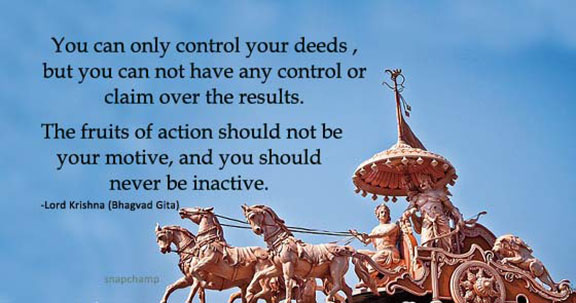🌿 The Root of Restlessness:
What the Bhagavad Gita Says About Overthinking and Self-Worth
Many of us overthink everything—what we said, how we looked, whether people liked us. We feel anxious, restless, and unsure. But why?
The Bhagavad Gita, a sacred conversation between Lord Krishna and Arjuna on the battlefield of Kurukshetra, gives us answers. Even though it was spoken thousands of years ago, its wisdom still fits today’s world.
At its heart, the Gita says that the real problem is not outside—it’s inside our own mind. When the mind is confused by Maya (illusion) and full of Ahamkara (ego), it constantly looks for validation from others. We forget who we truly are.
But the Gita shows a way out—a return to peace, strength, and true self-worth.
Let’s explore how.
1. Follow Your Own Path – Swadharma
This means: you are not here to live someone else’s life. You have your own path, your own nature, your Swadharma. When you try to become what others want, you lose yourself.
Many people feel anxious because they are trying to meet others' expectations—parents, society, social media. But when you walk your true path, your mind becomes calmer. You don’t have to pretend. You just have to be real.
2. Act Without Fear – Karma Yoga
This is powerful. It means: do your best, but don’t obsess over results. You can control your actions—not how others respond. Let go of the outcome.
When you live like this, your mind relaxes. You stop worrying about judgment and start focusing on your growth.
3. Train the Mind – Or It Will Train You
The mind is like a wild horse. If you don’t guide it, it will run everywhere—especially into worry.
The Gita says the mind can be your friend or your enemy. A trained mind helps you stay calm. An untrained mind keeps pulling you into fear and self-doubt.
How do we train the mind?
4. Stay Steady in Ups and Downs – Samatvam
One day someone praises you. Another day, they criticize. If your peace depends on others, you will always be shaken.
That’s why the Gita teaches Samatvam—equanimity, or balance.
📜 "Remain the same in success and failure, pleasure and pain."
This doesn’t mean becoming emotionless. It means not letting your happiness rise and fall with every opinion. When you are steady inside, the noise outside doesn’t affect you so much.
5. Look Beyond the Illusion – Maya
Most of the things we worry about are not even real. They are shadows in our mind—fears of things that may never happen.
The Gita calls this Maya—the illusion that hides the truth.
Judgments from others often come from their own insecurities, not your truth. When you understand this, you stop taking things so personally. You begin to see clearly.
6. Let Go of Ego – Ahamkara
📜 The Gita says: "Like a lotus leaf untouched by water, live in the world without attachment."
This means: don’t let your self-worth get stuck to every opinion or situation. You don’t have to prove anything. When you drop ego, you find freedom.
7. Be in the Present – Not the Past or Future
But peace lives in the present.
The Gita reminds us to be fully present in every action—whether eating, working, talking, or resting. When you are here, now, your mind doesn’t run wild.
The Real Battle Is Inside
Krishna didn’t give him comfort from the outside. He gave him inner strength. He reminded Arjuna of who he really was.
You can do the same. You don’t need to change the world—you need to stop letting the world change your truth.
Final Thought: If Opinions Vanished, Would You Still Know Who You Are?
Next time you catch yourself thinking, “What will they think of me?”, take a breath.
That is the real test of self-worth.
You are already enough. You are already wise. You are already whole.
The Bhagavad Gita doesn’t just teach us how to live—it teaches us how to be free.
Related Videos:
Comments
Post a Comment
Incase of any question pls reach out to us.